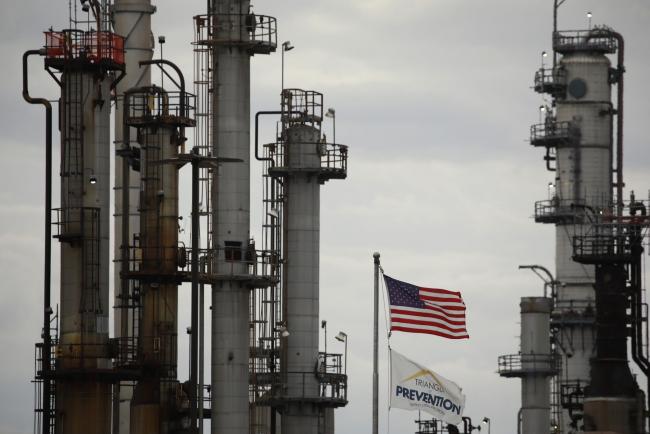(Bloomberg) -- U.S. refiners will emerge in late April and May from one of their heaviest and longest pre-summer maintenance seasons into a market roiled by spiking crude prices, geopolitical upheavals and pump prices high enough to discourage driving if inflation gets any worse.
It’s also a market awash in opportunities: Tight domestic supplies, demand so far immune to the price surge, hefty margins and a wealth of export opportunities as European rivals struggle with high natural gas costs and a dearth of crude and feedstocks because of sanctions imposed on Russia for its invasion of Ukraine.
The real ace in the hole for U.S. refiners is the combination of scarce supply and persistently strong demand. The impact will be felt even more in peak driving periods and when production is disrupted by unplanned repairs and natural disasters like hurricanes.
More than 1 million barrels a day of capacity was lost to refinery closures and conversions to renewable diesel plants over the last few years. The next capacity increase won’t come until at least 2023 and 2024, when Exxon Mobil Corp (NYSE:XOM) and Valero Energy Corp (NYSE:VLO) expand their capacity on the Texas Gulf Coast by a combined 350,000 barrels.
“Right now, the only solver for the shortfall in supply is having prices high enough to make demand come off,” said Robert Campbell, head of oil products research at London-based consultancy Energy Aspects.
Energy Aspects forecasts maintenance is shutting in more than 1.2 million barrels a day of U.S. crude-processing capacity January through May, higher than the average for the same period in the five years to 2019. Refiners are rushing to complete work postponed during the height of the pandemic in 2020 and part of 2021
Maintenance has helped keep supply in check. Gasoline stocks measured 238 million barrels in the week ended March 18, the seventh consecutive decline and the lowest since Dec. 31. U.S. distillate inventories are even tighter, dropping nine of 10 weeks to 112 million barrels, the lowest since April 2014.
As refiners complete maintenance, strong margins await. The 3-2-1 crack spread, a measure of the profit for refining crude into products like gasoline and diesel, jumped 2% Tuesday to above $32 a barrel. Margins will have to stay high to offset higher crude prices. West Texas Intermediate crude, has traded mostly above $100 a barrel after Russia invaded Ukraine.
“Everyone in turnaround is saying ‘lets get this thing buttoned up and get running,’ and everybody that can will run as hard as they can,” said John Auers, executive vice president at Turner Mason & Co. in Dallas “They’re taking a chance if they don’t take advantage of these margins. Unless you get a big recession, you’re in for a sustained bullish environment for refiners given the tight supply.”
Inflation, already at a four-decade high, could still dampen demand. Federal Reserve Chair Jerome Powell has set the central bank on course for a series of interest-rate hikes, stressing the toll of price increases on lower-income Americans. The Fed has already begun raising the benchmark lending rate to bring price pressure under control.
At the least, it appears U.S. drivers will pay higher pump prices if they want to hit the road for summer vacations. The average price for a gallon of regular gasoline at the pump Tuesday was $4.24, according to AAA. The average has moderated since reaching $4.33 on March 10.
“This summer the American driver is going to get on the road,” said Andy Lipow, president of Lipow Oil Associates in Houston. “They will cut back spending elsewhere. They’ve been cooped up for two years.”
Refiners are already showing their willingness to rev up rates. Refinery utilization rose a fifth consecutive time to 90.1%, the highest since Aug. 27. Refinery utilization on the Gulf Coast, the largest concentration of U.S. refining might, was 94.3%, the highest since Jan. 2020.
Refiners on the Gulf Coast in particular may find one hurdle to maxing out rates is finding a replacement for Russia’s vacuum gas oil, a key feedstock for their gasoline-making fluid catalytic crackers. “It’s nearly impossible to replace and they will lose gasoline yields, said Amrita Sen, co-founder and director of research at Energy Aspects.
Refining margins (in $/bbl):
- Maya U.S. Gulf coking at $26.04 (March 25)
- LLS U.S. Gulf cracking at $18.71 (March 25)
- WCS U.S. Midcontinent coking at $47.83 (March 25)
- East Coast Forcados cracking at $14,40 (March 25)
- U.S. West Coast WCS crude oil 3-2-1 crack spread at $53.05
- Nymex 3-2-1 front-month crack spread at $32.09
- For more crack spreads, see CRCK
©2022 Bloomberg L.P.
